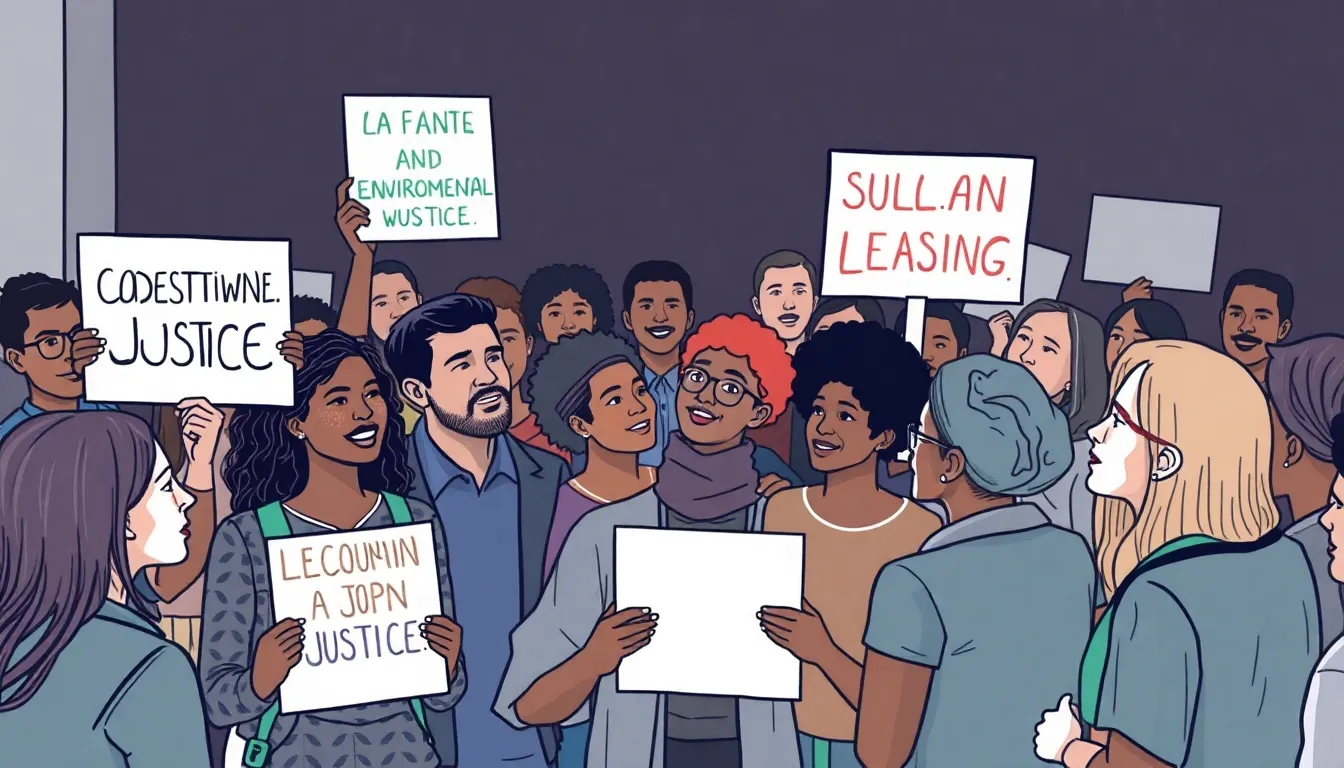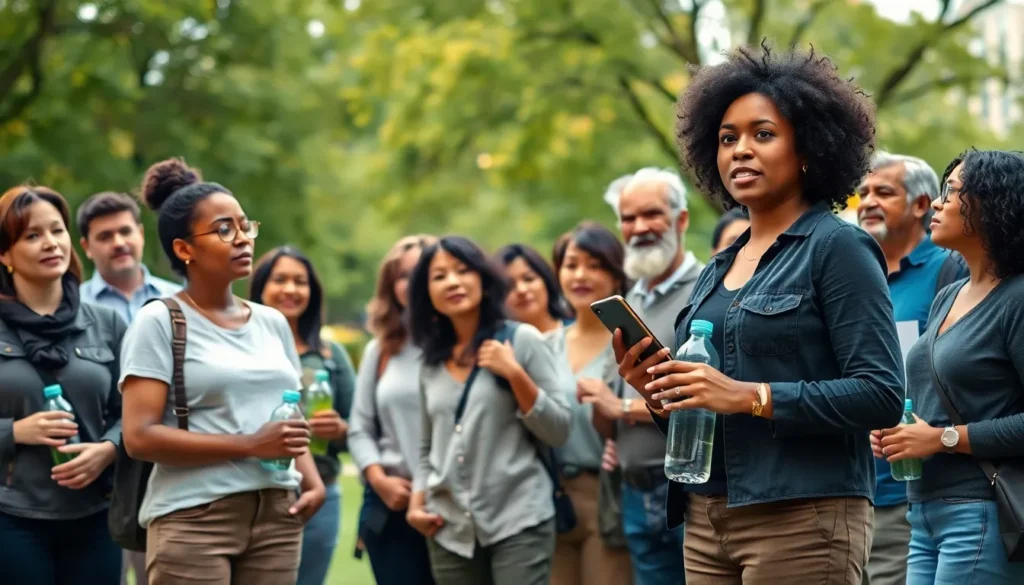In a world where politics can feel like a soap opera, political advocacy stands out as the real drama. It’s not just about shouting slogans or waving signs; it’s about making a genuine impact. Whether it’s fighting for climate change, social justice, or healthcare reform, advocacy gives everyone a voice—even if they sometimes sound like a broken record at family dinners.
Table of Contents
ToggleUnderstanding Political Advocacy
Political advocacy encompasses activities aimed at influencing public policy decisions and promoting particular causes. These efforts empower individuals and groups to engage with decision-makers and shape the political landscape.
Definition of Political Advocacy
Political advocacy involves efforts to persuade policymakers and the public regarding specific issues. It includes both organized campaigns and grassroots movements aimed at advancing social, economic, or environmental goals. Individuals advocate for causes that matter to them, often utilizing various tactics such as lobbying, public speaking, and mobilizing supporters. Advocacy can occur at local, state, or national levels, demonstrating the diverse range of voices contributing to policy discussions.
Importance in the Democratic Process
Political advocacy plays a crucial role in the democratic process by enhancing citizen participation. Engaging in advocacy enables individuals to express their views and concerns directly to lawmakers and the community. Advocacy impacts policy development and ensures that different perspectives are considered in decision-making. Additionally, it fosters accountability among elected officials by encouraging them to respond to constituents’ needs. Advocacy contributes to a vibrant democracy by ensuring that voices of the people influence the political agenda.
Types of Political Advocacy

Political advocacy takes various forms. Understanding these types enhances awareness of how individuals can influence change.
Grassroots Advocacy
Grassroots advocacy empowers communities to initiate change at local levels. Individuals participate in campaigns that mobilize support for specific causes. This approach relies on volunteer efforts, utilizing social media and community organizing. For instance, local activists often engage community members through events and outreach programs. When community voices unite, they can significantly impact public policy decisions. Grassroots efforts frequently promote issues like environmental justice and education reform. Ultimately, grassroots advocacy maintains a direct connection between citizens and their representatives.
Lobbying and Direct Advocacy
Lobbying involves influencing decision-makers through organized efforts. Professional lobbyists often represent corporations, non-profits, and other organizations. They build relationships with lawmakers to advocate for specific legislation. Direct advocacy engages individuals in initiatives that aim for immediate policy changes. For example, citizens may attend legislative sessions or participate in advocacy days. These activities enable direct interaction with public officials. When advocates present data and personal stories, they humanize complex issues. Both lobbying and direct advocacy contribute to shaping legislative priorities, driving significant changes in policy.
Strategies for Effective Political Advocacy
Effective political advocacy requires strategic approaches to maximize impact. These strategies enable individuals and organizations to navigate complexities in the political landscape.
Building Coalitions
Building coalitions strengthens advocacy efforts and amplifies voices. Diverse groups aligning around common goals can establish powerful partnerships. Engaging nonprofits, local organizations, and community leaders fosters collaboration. Joint campaigns often access broader resources and networks, enhancing outreach. Sharing responsibilities through collective efforts maximizes benefits for all parties involved. Regular communication among coalition members promotes trust and unity, ensuring stakeholders stay informed and engaged.
Utilizing Social Media
Utilizing social media serves as a critical tool for modern advocacy. Platforms such as Twitter, Facebook, and Instagram allow quick dissemination of information. Engaging posts can reach vast audiences, sparking conversations about important issues. Campaigns harnessing hashtags and trending topics can draw attention to causes. Visual content, such as videos and infographics, captures attention and encourages sharing. Interacting with followers fosters community and builds solidarity around shared objectives. These interactions provide direct lines to policymakers, allowing for immediate responses and engagements.
Challenges in Political Advocacy
Political advocacy faces several challenges that can hinder its effectiveness in influencing policy and public opinion. Legal regulations and public perception play significant roles in shaping advocacy efforts.
Legal Regulations
Legal regulations present barriers for advocates aiming to influence policy changes. Compliance with campaign finance laws often limits funding sources for advocacy groups. Additionally, stringent rules surrounding lobbying can restrict access to lawmakers, making it difficult for citizens to voice their concerns. Some states impose requirements that complicate organizing grassroots efforts. Advocacy organizations must navigate these complexities to maintain their influence and ensure their initiatives reach decision-makers effectively.
Public Perception
Public perception significantly impacts the success of advocacy campaigns. Negative stereotypes surrounding political advocacy can lead to skepticism about motives and intentions. Many people view these efforts as self-serving rather than altruistic. Additionally, heavy media coverage of certain causes can overshadow others, causing some issues to receive less attention. Misunderstandings about advocacy tactics can also alienate potential supporters. Building trust and cultivating positive images through transparent practices can foster the support necessary for successful advocacy.
Political advocacy plays a crucial role in shaping society by empowering individuals to voice their concerns and influence public policy. Through grassroots movements and organized campaigns, citizens can drive change on pressing issues like climate change and social justice.
The effectiveness of advocacy hinges on building coalitions and utilizing modern tools like social media to engage wider audiences. Despite challenges such as legal barriers and public perception, advocates can cultivate trust and foster a supportive environment for their causes.
Ultimately, active participation in political advocacy not only enhances democracy but also ensures that diverse voices contribute to the political landscape, paving the way for meaningful change.





